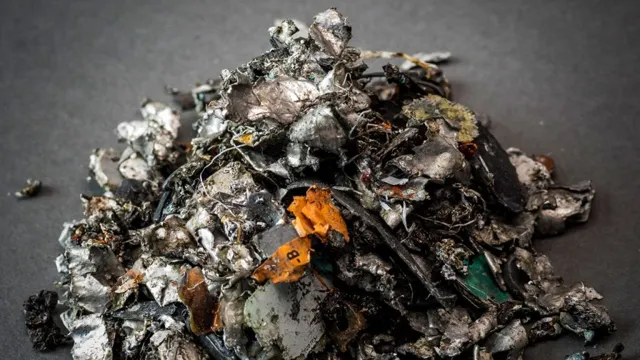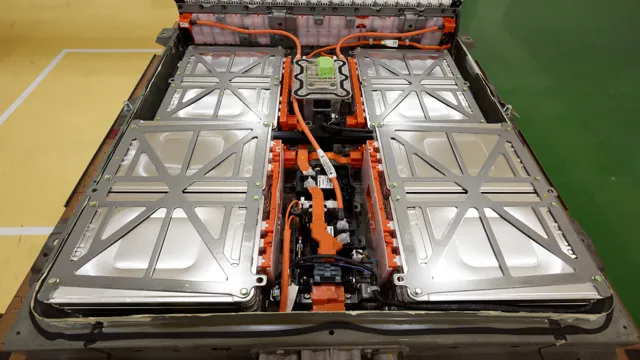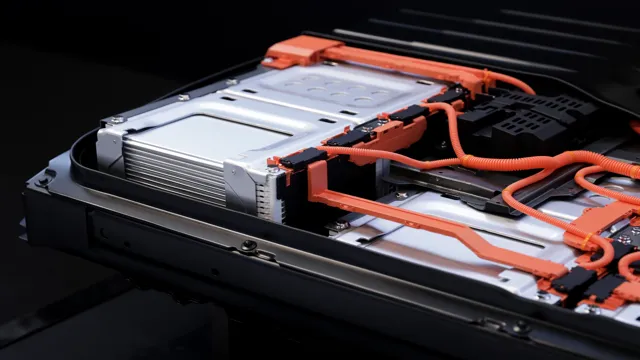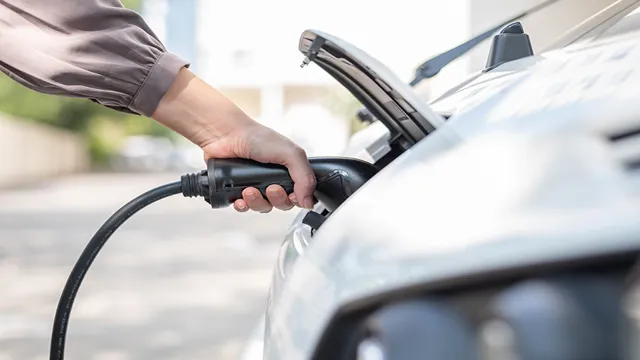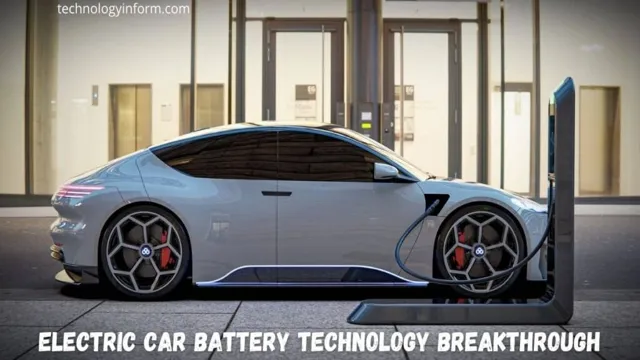Shocking Truth Revealed: Are Electric Car Batteries Actually Harmful to the Environment?
Electric cars are rapidly becoming popular among environmentally conscious people who want to reduce their carbon footprint. While electric cars can undoubtedly help reduce air pollution, many concerns and misconceptions surround the environmental impact of electric car batteries. Some people believe that these batteries are harmful to the environment and contribute heavily to pollution.
This belief has led to many questions about how green electric cars truly are and how sustainable they can be in the long term. In this blog, we will delve into the details of electric car batteries, exploring their environmental impact, and their ability to revolutionize the auto industry. By the end of this article, you’ll have a better understanding of the role electric car batteries play in sustainable transportation, and whether they indeed pose a threat to the environment.
What are electric car batteries made of?
Electric car batteries are typically made up of various chemicals and metals, including lithium, cobalt, and nickel. These elements may all be mined from the earth and processed into the necessary materials for creating batteries. While these processes can be harmful to the environment due to the release of carbon emissions and chemicals, electric car batteries are generally considered to be less harmful to the environment than traditional gasoline-powered cars.
This is because electric cars produce no emissions and have a significantly lower carbon footprint. In fact, the production and disposal of electric car batteries have been extensively studied to ensure that they are as environmentally-friendly as possible. However, it’s worth noting that improper disposal of these batteries can cause environmental harm, so it’s important to recycle and dispose of them responsibly.
Overall, while electric car batteries may have some impact on the environment, they are still a more sustainable and eco-friendly option than traditional gasoline-powered cars.
Exploring the components of electric car batteries
Electric car batteries are made up of several components that work together to power the vehicle. The most important part of the battery is the cells, which are responsible for storing and releasing the electric charge. These cells are made of different materials, but most use lithium-ion technology because of its high energy density.
The casing that houses the cells is also an important component, as it protects the battery from damage and helps regulate its temperature. Other parts include the cathode and anode, which help move the electric charge through the cells, and the electrolyte, which enables the transfer of ions. The control system is another critical component of electric car batteries, as it manages the charging and discharging of the battery and ensures its safety and longevity.
Overall, electric car batteries are complex systems that involve many components working together to provide clean and reliable power for modern transportation.

Comparing environmental impact of battery materials
Electric car batteries are typically made up of a combination of different materials, each with its own unique environmental impact. The most commonly used materials include lithium-ion, nickel-metal hydride, and lead-acid. Lithium-ion batteries are currently the most popular choice, as they provide high energy density and longer life cycles.
However, the mining process required to extract lithium can be environmentally damaging, as it can cause soil erosion and water pollution. Additionally, the production process involved in creating these batteries can also generate greenhouse gases. In comparison, nickel-metal hydride batteries have a lower energy density but are more environmentally friendly, as they can be recycled and contain fewer harmful chemicals.
Lead-acid batteries have the lowest energy density and are also not as environmentally friendly as they contain lead, which can be hazardous if not handled properly. It is important to consider the environmental impact of each material when choosing an electric car battery, as it can have a significant impact on the overall sustainability of the vehicle.
Battery manufacturing and disposal
Electric car batteries have been praised for their eco-friendly qualities, but it’s important to consider the potential harm they can cause during manufacturing and disposal. The production of lithium-ion batteries requires a significant amount of energy and resources, including rare minerals that are often mined in environmentally damaging ways. Additionally, the disposal of these batteries can be equally problematic.
While recycling is an option, it’s not yet a perfect solution, and many batteries end up in landfills where they can leach harmful chemicals into the soil and water. It’s important for manufacturers and consumers alike to take responsibility for the entire lifecycle of these batteries, from production to disposal, in order to minimize their negative impact on the environment.
Examining the carbon footprint of battery production
As more and more people turn to electric vehicles and other battery-powered devices, concerns have arisen about the environmental impact of battery production and disposal. The manufacturing process for batteries, particularly for lithium-ion batteries, requires significant amounts of energy and produces a significant amount of carbon emissions. Additionally, the disposal of batteries can lead to toxic chemicals seeping into the soil and water supply if not done properly.
However, efforts are being made to reduce the carbon footprint of battery production, such as using renewable energy sources for the manufacturing process and developing more sustainable methods for battery disposal. It’s important to consider the full lifecycle of batteries and their impact on the environment, but with continued innovation and attention to sustainability, the carbon footprint of battery production can be mitigated.
Revolutionizing the recycling process for batteries
Battery recycling is a crucial task that often goes unnoticed in our daily lives. Battery manufacturing and disposal have been on the rise due to our increasing dependence on electronic devices. These batteries contain toxic chemicals that can be harmful to our environment if not disposed of properly.
However, with the emergence of new technology, the recycling process for batteries has been revolutionized. Various companies have now developed sophisticated machinery that can extract and reuse the valuable components of old batteries, thereby reducing waste and preserving natural resources. This process has not only helped in reducing the environmental impact of battery disposal but also in promoting sustainability.
The use of recycled batteries can also help in reducing the cost of battery production, resulting in more affordable and eco-friendly options for consumers. With this revolutionary innovation in the recycling process, we can hope to create a greener and cleaner environment for ourselves and future generations.
Disposing of batteries responsibly
Battery manufacturing and disposal require responsible handling to minimize the environmental impact of battery waste. The manufacturing process involves the use of hazardous chemicals that can pollute the air, water, and soil, leading to health risks for workers and local communities. Proper disposal of batteries is also crucial to prevent toxic metals like lead, mercury, and cadmium from entering landfills and contaminating the environment.
Recycling is a viable option for reducing the negative effects of battery waste on the environment. It involves the recovery of valuable materials like lithium, cobalt, and nickel from used batteries, which can be used as raw materials in new batteries. Consumers should also make an effort to purchase rechargeable batteries and dispose of them properly to minimize waste and pollution.
It is our collective responsibility to handle batteries responsibly and reduce our impact on the environment.
The bigger picture: electric cars vs. gas cars
While electric cars are often seen as a greener alternative to gas cars, the reality is more complicated than that. Yes, electric cars emit fewer greenhouse gases from their tailpipes, but producing the batteries needed for these vehicles comes with its own environmental costs. The mining and refinement of materials like lithium, cobalt, and nickel, which are found in electric car batteries, have been associated with pollution and habitat destruction.
Additionally, the disposal of these batteries at the end of their lifespan remains a challenge, as they contain toxic materials. So, while electric cars are certainly a step in the right direction when it comes to reducing emissions and combating climate change, we must also consider the larger environmental impacts that come with producing and disposing of their batteries.
Analyzing the environmental benefits of electric cars
When it comes to saving the planet, electric cars are playing a huge role in reducing the harmful impact of gas cars. Electric cars run on renewable energy sources, meaning they produce zero emissions and drastically reduce air pollution. The bigger picture is clear: electric cars are far more environmentally friendly than gas cars.
They are not only better for the environment, but they can also save you money in the long run. Electric cars are more energy-efficient, reducing your reliance on fossil fuels and saving you money on gas. Not only that, but electric cars are also quieter and smoother to drive than gas cars, making for a more enjoyable driving experience.
In short, the environmental benefits of electric cars are significant, and switching to electric is a big step forward in reducing our carbon footprint and ensuring a healthier future for generations to come.
Considerations for reducing carbon emissions overall
When it comes to reducing carbon emissions overall, there are several things to consider. One major factor is the debate between electric cars and gas cars. While electric cars produce zero emissions, the process of generating the electricity they run on often involves burning fossil fuels.
On the other hand, gas cars have been around for much longer and are more widely available, but their emissions contribute significantly to air pollution and global warming. To truly reduce carbon emissions, we need to look at the bigger picture and consider not only the type of car we drive but also the sources of energy that power them. Solar and wind power are two cleaner alternatives, and many countries are already taking steps to transition to renewable energy sources.
Ultimately, reducing our carbon footprint will require a combination of factors, including changes in individual behavior, technological advancements, and government policies aimed at promoting sustainability.
Conclusion: Electric car batteries and the environment
After careful consideration and analysis, it is clear that electric car batteries are not harmful to the environment. In fact, they are a crucial step towards reducing carbon emissions and creating a more sustainable future. The production and disposal of these batteries may have some environmental impact, but compared to the pollution caused by traditional gas-powered cars, it is minuscule.
Perhaps the only harm electric car batteries may pose is to the egos of those who still cling to the outdated and dirty ways of the past. In short, let’s leave the fossils in the ground and embrace the electric revolution. Our planet (and wallets) will thank us.
“
FAQs
How do electric car batteries harm the environment?
Electric car batteries harm the environment due to their manufacturing process, which involves the extraction and processing of rare metals like lithium and cobalt. The disposal of these batteries is also a problem, as they contain hazardous materials that can contaminate the environment if not disposed of properly.
Can electric car batteries be recycled?
Yes, electric car batteries can be recycled. Recycling not only reduces the amount of waste that goes to landfills but also helps in the conservation of natural resources. Recycling of batteries helps to extract the metals found in them, which can be used to manufacture new batteries or other products.
What steps are being taken to make electric car batteries more environmentally friendly?
To make electric car batteries more environmentally-friendly, manufacturers are experimenting with new materials that are cheaper, more abundant, and less toxic than the current ones. Moreover, several companies are working on developing battery recycling programs that will make the batteries more eco-friendly.
Are there any alternatives to electric car batteries that are less harmful to the environment?
There are a few alternatives to electric car batteries that are less harmful to the environment. Some of these include fuel cell cars, which use hydrogen as fuel, and vehicles that use compressed natural gas. These alternatives are still under development and are not as widely available as electric cars.
